Capital Market Analysis: Ordinary and Preference Share Analysis
VerifiedAdded on 2023/01/17
|14
|3485
|56
Report
AI Summary
This report provides a detailed analysis of ordinary and preference shares, crucial financial instruments within capital markets. It begins by outlining the fundamental differences between ordinary (equity) shares and preference shares, including shareholder rights, dividend payments, and voting privileges. The report then delves into the various types of preference shares, such as cumulative, non-cumulative, convertible, and redeemable shares, contrasting them with equity shares. It explores the advantages and disadvantages of both share types for companies and investors, highlighting considerations like risk, return, and control. The report also includes a comparison table summarizing key differences and similarities, offering a clear overview of the subject. The report further explores the types of equity shares and preference shares, which includes authorized share capital, issued share capital, and paid-up capital. The report concludes with a discussion on the role of these financial instruments in capital structure and investment decisions, making it a valuable resource for finance students and professionals alike.
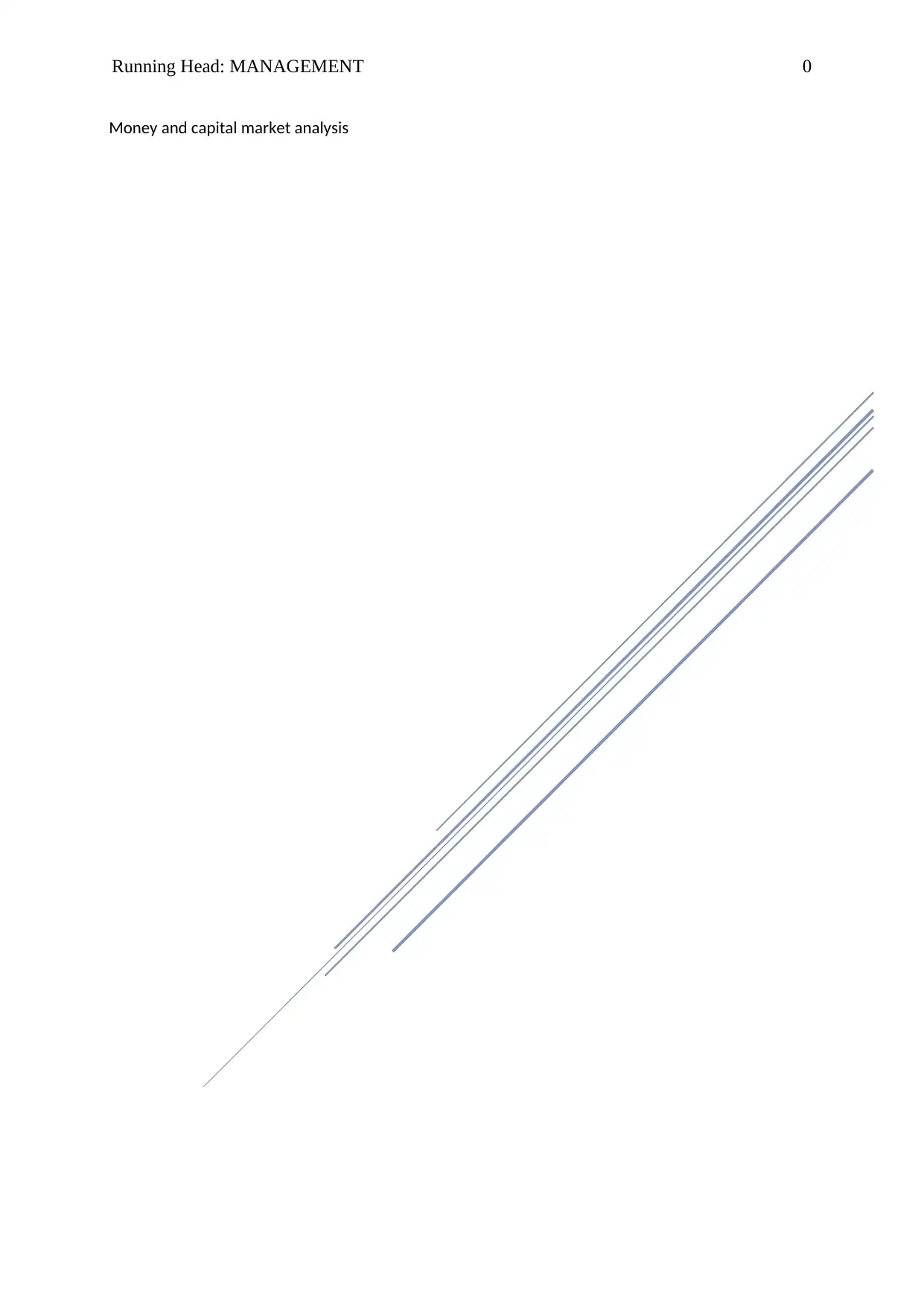
Running Head: MANAGEMENT 0
Money and capital market analysis
Money and capital market analysis
Paraphrase This Document
Need a fresh take? Get an instant paraphrase of this document with our AI Paraphraser
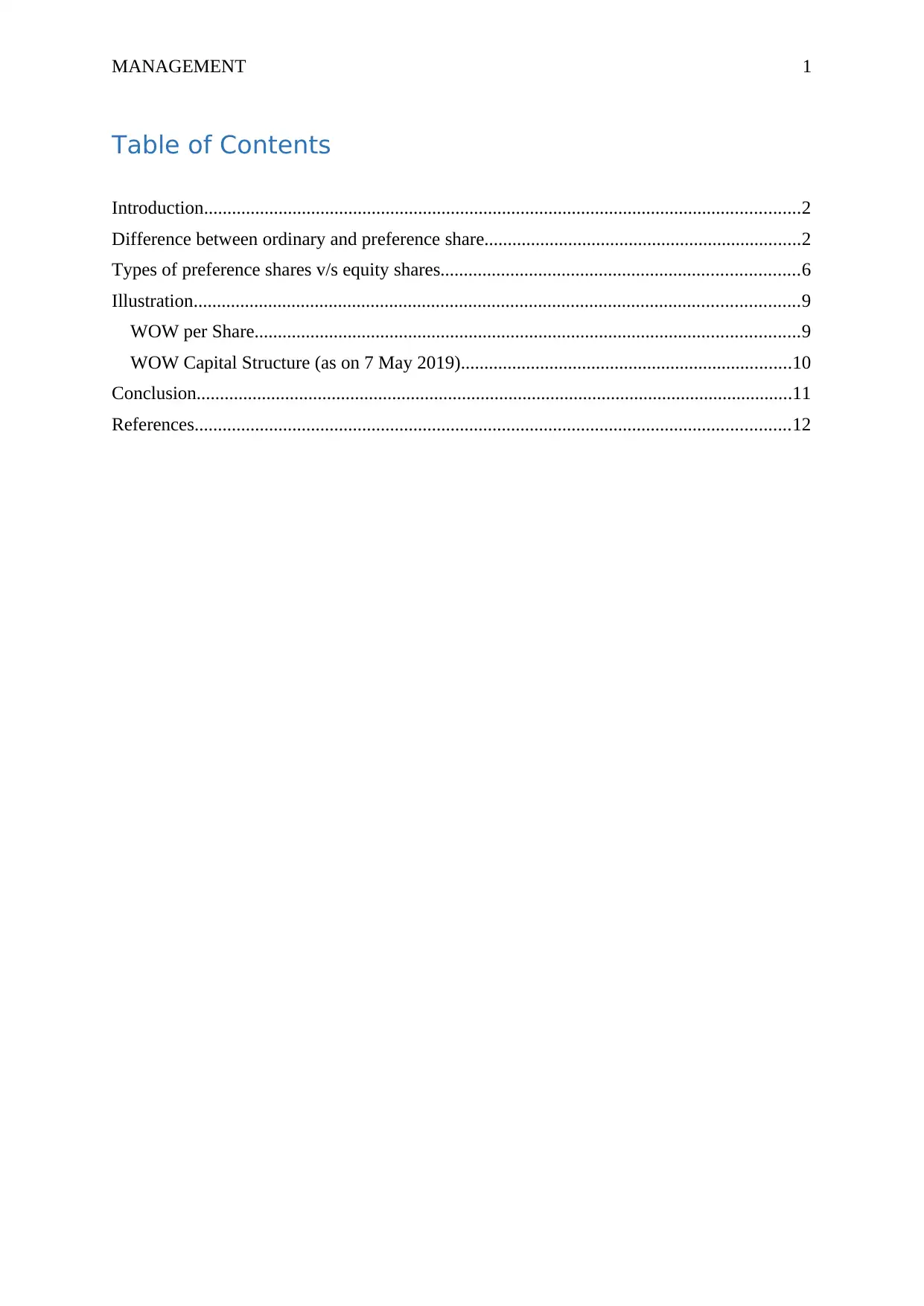
MANAGEMENT 1
Table of Contents
Introduction................................................................................................................................2
Difference between ordinary and preference share....................................................................2
Types of preference shares v/s equity shares.............................................................................6
Illustration..................................................................................................................................9
WOW per Share.....................................................................................................................9
WOW Capital Structure (as on 7 May 2019).......................................................................10
Conclusion................................................................................................................................11
References................................................................................................................................12
Table of Contents
Introduction................................................................................................................................2
Difference between ordinary and preference share....................................................................2
Types of preference shares v/s equity shares.............................................................................6
Illustration..................................................................................................................................9
WOW per Share.....................................................................................................................9
WOW Capital Structure (as on 7 May 2019).......................................................................10
Conclusion................................................................................................................................11
References................................................................................................................................12
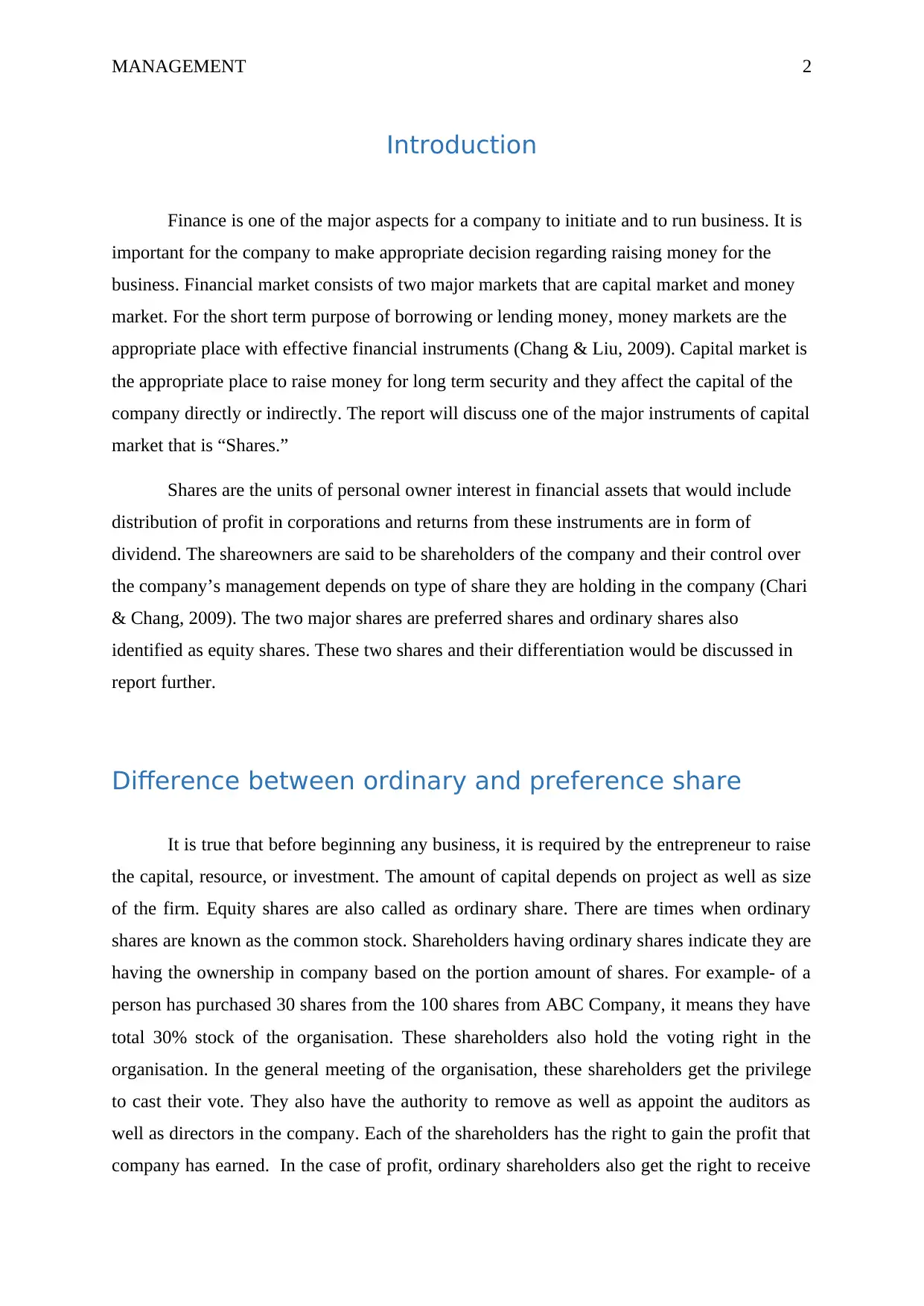
MANAGEMENT 2
Introduction
Finance is one of the major aspects for a company to initiate and to run business. It is
important for the company to make appropriate decision regarding raising money for the
business. Financial market consists of two major markets that are capital market and money
market. For the short term purpose of borrowing or lending money, money markets are the
appropriate place with effective financial instruments (Chang & Liu, 2009). Capital market is
the appropriate place to raise money for long term security and they affect the capital of the
company directly or indirectly. The report will discuss one of the major instruments of capital
market that is “Shares.”
Shares are the units of personal owner interest in financial assets that would include
distribution of profit in corporations and returns from these instruments are in form of
dividend. The shareowners are said to be shareholders of the company and their control over
the company’s management depends on type of share they are holding in the company (Chari
& Chang, 2009). The two major shares are preferred shares and ordinary shares also
identified as equity shares. These two shares and their differentiation would be discussed in
report further.
Difference between ordinary and preference share
It is true that before beginning any business, it is required by the entrepreneur to raise
the capital, resource, or investment. The amount of capital depends on project as well as size
of the firm. Equity shares are also called as ordinary share. There are times when ordinary
shares are known as the common stock. Shareholders having ordinary shares indicate they are
having the ownership in company based on the portion amount of shares. For example- of a
person has purchased 30 shares from the 100 shares from ABC Company, it means they have
total 30% stock of the organisation. These shareholders also hold the voting right in the
organisation. In the general meeting of the organisation, these shareholders get the privilege
to cast their vote. They also have the authority to remove as well as appoint the auditors as
well as directors in the company. Each of the shareholders has the right to gain the profit that
company has earned. In the case of profit, ordinary shareholders also get the right to receive
Introduction
Finance is one of the major aspects for a company to initiate and to run business. It is
important for the company to make appropriate decision regarding raising money for the
business. Financial market consists of two major markets that are capital market and money
market. For the short term purpose of borrowing or lending money, money markets are the
appropriate place with effective financial instruments (Chang & Liu, 2009). Capital market is
the appropriate place to raise money for long term security and they affect the capital of the
company directly or indirectly. The report will discuss one of the major instruments of capital
market that is “Shares.”
Shares are the units of personal owner interest in financial assets that would include
distribution of profit in corporations and returns from these instruments are in form of
dividend. The shareowners are said to be shareholders of the company and their control over
the company’s management depends on type of share they are holding in the company (Chari
& Chang, 2009). The two major shares are preferred shares and ordinary shares also
identified as equity shares. These two shares and their differentiation would be discussed in
report further.
Difference between ordinary and preference share
It is true that before beginning any business, it is required by the entrepreneur to raise
the capital, resource, or investment. The amount of capital depends on project as well as size
of the firm. Equity shares are also called as ordinary share. There are times when ordinary
shares are known as the common stock. Shareholders having ordinary shares indicate they are
having the ownership in company based on the portion amount of shares. For example- of a
person has purchased 30 shares from the 100 shares from ABC Company, it means they have
total 30% stock of the organisation. These shareholders also hold the voting right in the
organisation. In the general meeting of the organisation, these shareholders get the privilege
to cast their vote. They also have the authority to remove as well as appoint the auditors as
well as directors in the company. Each of the shareholders has the right to gain the profit that
company has earned. In the case of profit, ordinary shareholders also get the right to receive
⊘ This is a preview!⊘
Do you want full access?
Subscribe today to unlock all pages.

Trusted by 1+ million students worldwide
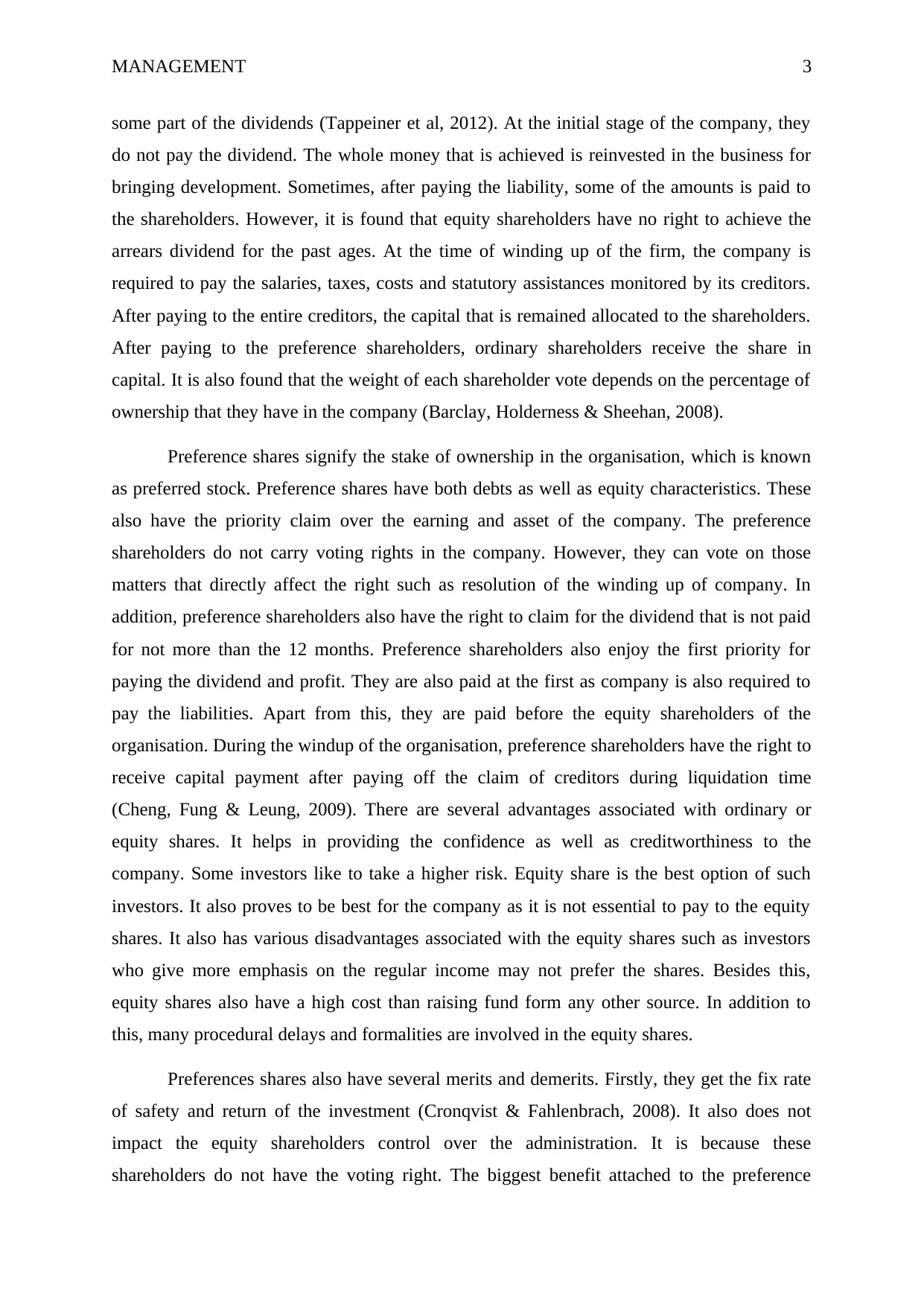
MANAGEMENT 3
some part of the dividends (Tappeiner et al, 2012). At the initial stage of the company, they
do not pay the dividend. The whole money that is achieved is reinvested in the business for
bringing development. Sometimes, after paying the liability, some of the amounts is paid to
the shareholders. However, it is found that equity shareholders have no right to achieve the
arrears dividend for the past ages. At the time of winding up of the firm, the company is
required to pay the salaries, taxes, costs and statutory assistances monitored by its creditors.
After paying to the entire creditors, the capital that is remained allocated to the shareholders.
After paying to the preference shareholders, ordinary shareholders receive the share in
capital. It is also found that the weight of each shareholder vote depends on the percentage of
ownership that they have in the company (Barclay, Holderness & Sheehan, 2008).
Preference shares signify the stake of ownership in the organisation, which is known
as preferred stock. Preference shares have both debts as well as equity characteristics. These
also have the priority claim over the earning and asset of the company. The preference
shareholders do not carry voting rights in the company. However, they can vote on those
matters that directly affect the right such as resolution of the winding up of company. In
addition, preference shareholders also have the right to claim for the dividend that is not paid
for not more than the 12 months. Preference shareholders also enjoy the first priority for
paying the dividend and profit. They are also paid at the first as company is also required to
pay the liabilities. Apart from this, they are paid before the equity shareholders of the
organisation. During the windup of the organisation, preference shareholders have the right to
receive capital payment after paying off the claim of creditors during liquidation time
(Cheng, Fung & Leung, 2009). There are several advantages associated with ordinary or
equity shares. It helps in providing the confidence as well as creditworthiness to the
company. Some investors like to take a higher risk. Equity share is the best option of such
investors. It also proves to be best for the company as it is not essential to pay to the equity
shares. It also has various disadvantages associated with the equity shares such as investors
who give more emphasis on the regular income may not prefer the shares. Besides this,
equity shares also have a high cost than raising fund form any other source. In addition to
this, many procedural delays and formalities are involved in the equity shares.
Preferences shares also have several merits and demerits. Firstly, they get the fix rate
of safety and return of the investment (Cronqvist & Fahlenbrach, 2008). It also does not
impact the equity shareholders control over the administration. It is because these
shareholders do not have the voting right. The biggest benefit attached to the preference
some part of the dividends (Tappeiner et al, 2012). At the initial stage of the company, they
do not pay the dividend. The whole money that is achieved is reinvested in the business for
bringing development. Sometimes, after paying the liability, some of the amounts is paid to
the shareholders. However, it is found that equity shareholders have no right to achieve the
arrears dividend for the past ages. At the time of winding up of the firm, the company is
required to pay the salaries, taxes, costs and statutory assistances monitored by its creditors.
After paying to the entire creditors, the capital that is remained allocated to the shareholders.
After paying to the preference shareholders, ordinary shareholders receive the share in
capital. It is also found that the weight of each shareholder vote depends on the percentage of
ownership that they have in the company (Barclay, Holderness & Sheehan, 2008).
Preference shares signify the stake of ownership in the organisation, which is known
as preferred stock. Preference shares have both debts as well as equity characteristics. These
also have the priority claim over the earning and asset of the company. The preference
shareholders do not carry voting rights in the company. However, they can vote on those
matters that directly affect the right such as resolution of the winding up of company. In
addition, preference shareholders also have the right to claim for the dividend that is not paid
for not more than the 12 months. Preference shareholders also enjoy the first priority for
paying the dividend and profit. They are also paid at the first as company is also required to
pay the liabilities. Apart from this, they are paid before the equity shareholders of the
organisation. During the windup of the organisation, preference shareholders have the right to
receive capital payment after paying off the claim of creditors during liquidation time
(Cheng, Fung & Leung, 2009). There are several advantages associated with ordinary or
equity shares. It helps in providing the confidence as well as creditworthiness to the
company. Some investors like to take a higher risk. Equity share is the best option of such
investors. It also proves to be best for the company as it is not essential to pay to the equity
shares. It also has various disadvantages associated with the equity shares such as investors
who give more emphasis on the regular income may not prefer the shares. Besides this,
equity shares also have a high cost than raising fund form any other source. In addition to
this, many procedural delays and formalities are involved in the equity shares.
Preferences shares also have several merits and demerits. Firstly, they get the fix rate
of safety and return of the investment (Cronqvist & Fahlenbrach, 2008). It also does not
impact the equity shareholders control over the administration. It is because these
shareholders do not have the voting right. The biggest benefit attached to the preference
Paraphrase This Document
Need a fresh take? Get an instant paraphrase of this document with our AI Paraphraser
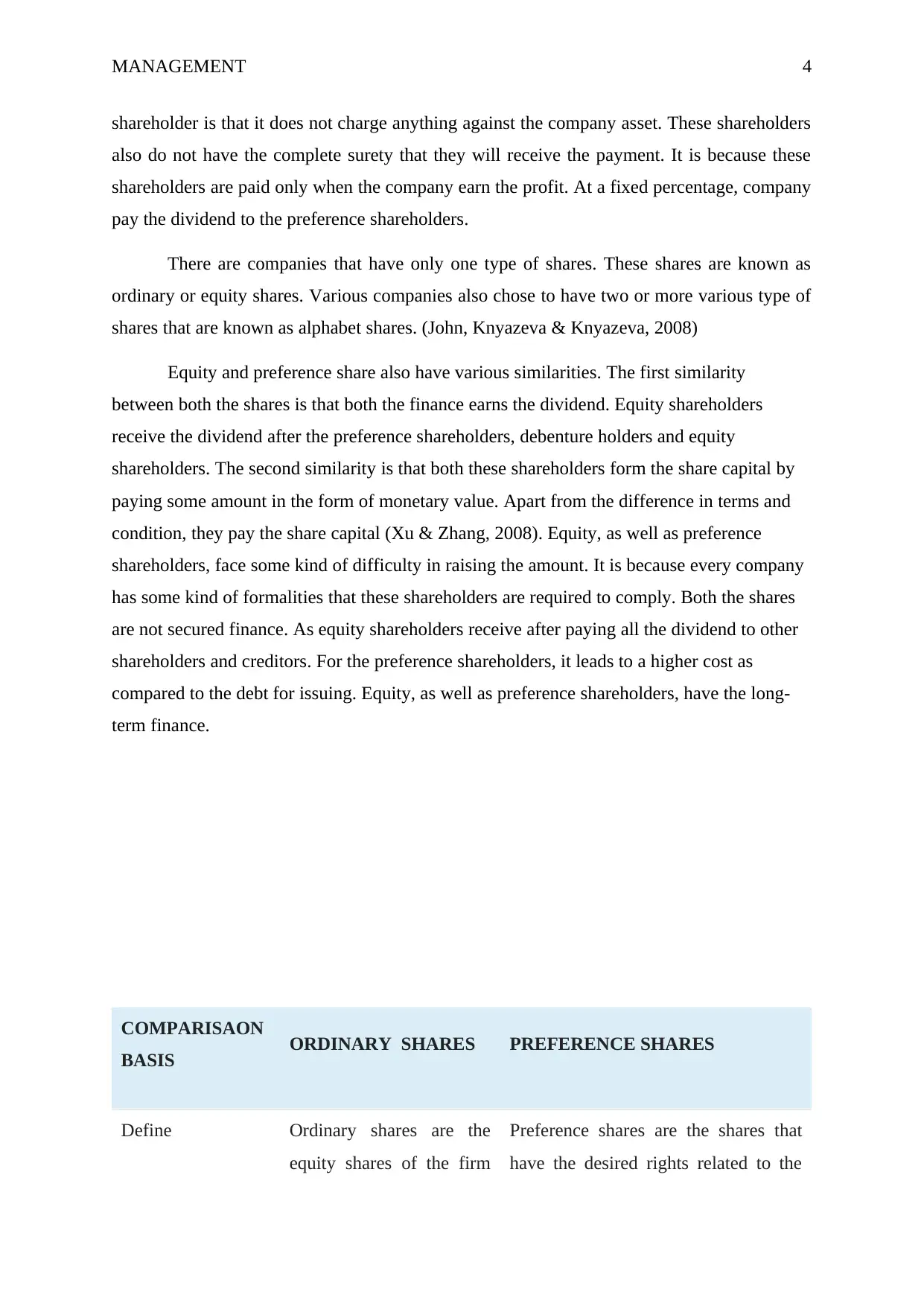
MANAGEMENT 4
shareholder is that it does not charge anything against the company asset. These shareholders
also do not have the complete surety that they will receive the payment. It is because these
shareholders are paid only when the company earn the profit. At a fixed percentage, company
pay the dividend to the preference shareholders.
There are companies that have only one type of shares. These shares are known as
ordinary or equity shares. Various companies also chose to have two or more various type of
shares that are known as alphabet shares. (John, Knyazeva & Knyazeva, 2008)
Equity and preference share also have various similarities. The first similarity
between both the shares is that both the finance earns the dividend. Equity shareholders
receive the dividend after the preference shareholders, debenture holders and equity
shareholders. The second similarity is that both these shareholders form the share capital by
paying some amount in the form of monetary value. Apart from the difference in terms and
condition, they pay the share capital (Xu & Zhang, 2008). Equity, as well as preference
shareholders, face some kind of difficulty in raising the amount. It is because every company
has some kind of formalities that these shareholders are required to comply. Both the shares
are not secured finance. As equity shareholders receive after paying all the dividend to other
shareholders and creditors. For the preference shareholders, it leads to a higher cost as
compared to the debt for issuing. Equity, as well as preference shareholders, have the long-
term finance.
COMPARISAON
BASIS ORDINARY SHARES PREFERENCE SHARES
Define Ordinary shares are the
equity shares of the firm
Preference shares are the shares that
have the desired rights related to the
shareholder is that it does not charge anything against the company asset. These shareholders
also do not have the complete surety that they will receive the payment. It is because these
shareholders are paid only when the company earn the profit. At a fixed percentage, company
pay the dividend to the preference shareholders.
There are companies that have only one type of shares. These shares are known as
ordinary or equity shares. Various companies also chose to have two or more various type of
shares that are known as alphabet shares. (John, Knyazeva & Knyazeva, 2008)
Equity and preference share also have various similarities. The first similarity
between both the shares is that both the finance earns the dividend. Equity shareholders
receive the dividend after the preference shareholders, debenture holders and equity
shareholders. The second similarity is that both these shareholders form the share capital by
paying some amount in the form of monetary value. Apart from the difference in terms and
condition, they pay the share capital (Xu & Zhang, 2008). Equity, as well as preference
shareholders, face some kind of difficulty in raising the amount. It is because every company
has some kind of formalities that these shareholders are required to comply. Both the shares
are not secured finance. As equity shareholders receive after paying all the dividend to other
shareholders and creditors. For the preference shareholders, it leads to a higher cost as
compared to the debt for issuing. Equity, as well as preference shareholders, have the long-
term finance.
COMPARISAON
BASIS ORDINARY SHARES PREFERENCE SHARES
Define Ordinary shares are the
equity shares of the firm
Preference shares are the shares that
have the desired rights related to the
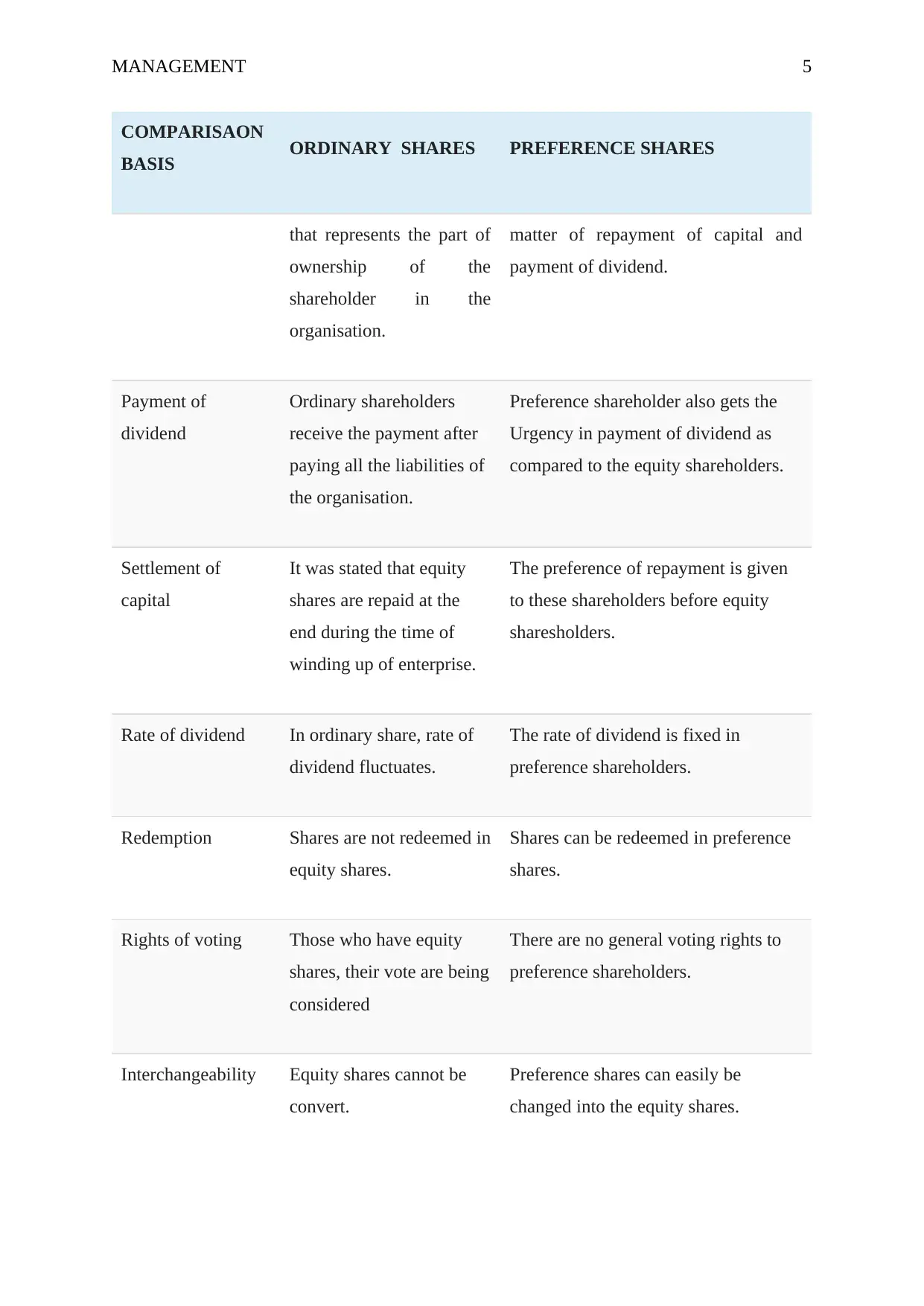
MANAGEMENT 5
COMPARISAON
BASIS ORDINARY SHARES PREFERENCE SHARES
that represents the part of
ownership of the
shareholder in the
organisation.
matter of repayment of capital and
payment of dividend.
Payment of
dividend
Ordinary shareholders
receive the payment after
paying all the liabilities of
the organisation.
Preference shareholder also gets the
Urgency in payment of dividend as
compared to the equity shareholders.
Settlement of
capital
It was stated that equity
shares are repaid at the
end during the time of
winding up of enterprise.
The preference of repayment is given
to these shareholders before equity
sharesholders.
Rate of dividend In ordinary share, rate of
dividend fluctuates.
The rate of dividend is fixed in
preference shareholders.
Redemption Shares are not redeemed in
equity shares.
Shares can be redeemed in preference
shares.
Rights of voting Those who have equity
shares, their vote are being
considered
There are no general voting rights to
preference shareholders.
Interchangeability Equity shares cannot be
convert.
Preference shares can easily be
changed into the equity shares.
COMPARISAON
BASIS ORDINARY SHARES PREFERENCE SHARES
that represents the part of
ownership of the
shareholder in the
organisation.
matter of repayment of capital and
payment of dividend.
Payment of
dividend
Ordinary shareholders
receive the payment after
paying all the liabilities of
the organisation.
Preference shareholder also gets the
Urgency in payment of dividend as
compared to the equity shareholders.
Settlement of
capital
It was stated that equity
shares are repaid at the
end during the time of
winding up of enterprise.
The preference of repayment is given
to these shareholders before equity
sharesholders.
Rate of dividend In ordinary share, rate of
dividend fluctuates.
The rate of dividend is fixed in
preference shareholders.
Redemption Shares are not redeemed in
equity shares.
Shares can be redeemed in preference
shares.
Rights of voting Those who have equity
shares, their vote are being
considered
There are no general voting rights to
preference shareholders.
Interchangeability Equity shares cannot be
convert.
Preference shares can easily be
changed into the equity shares.
⊘ This is a preview!⊘
Do you want full access?
Subscribe today to unlock all pages.

Trusted by 1+ million students worldwide
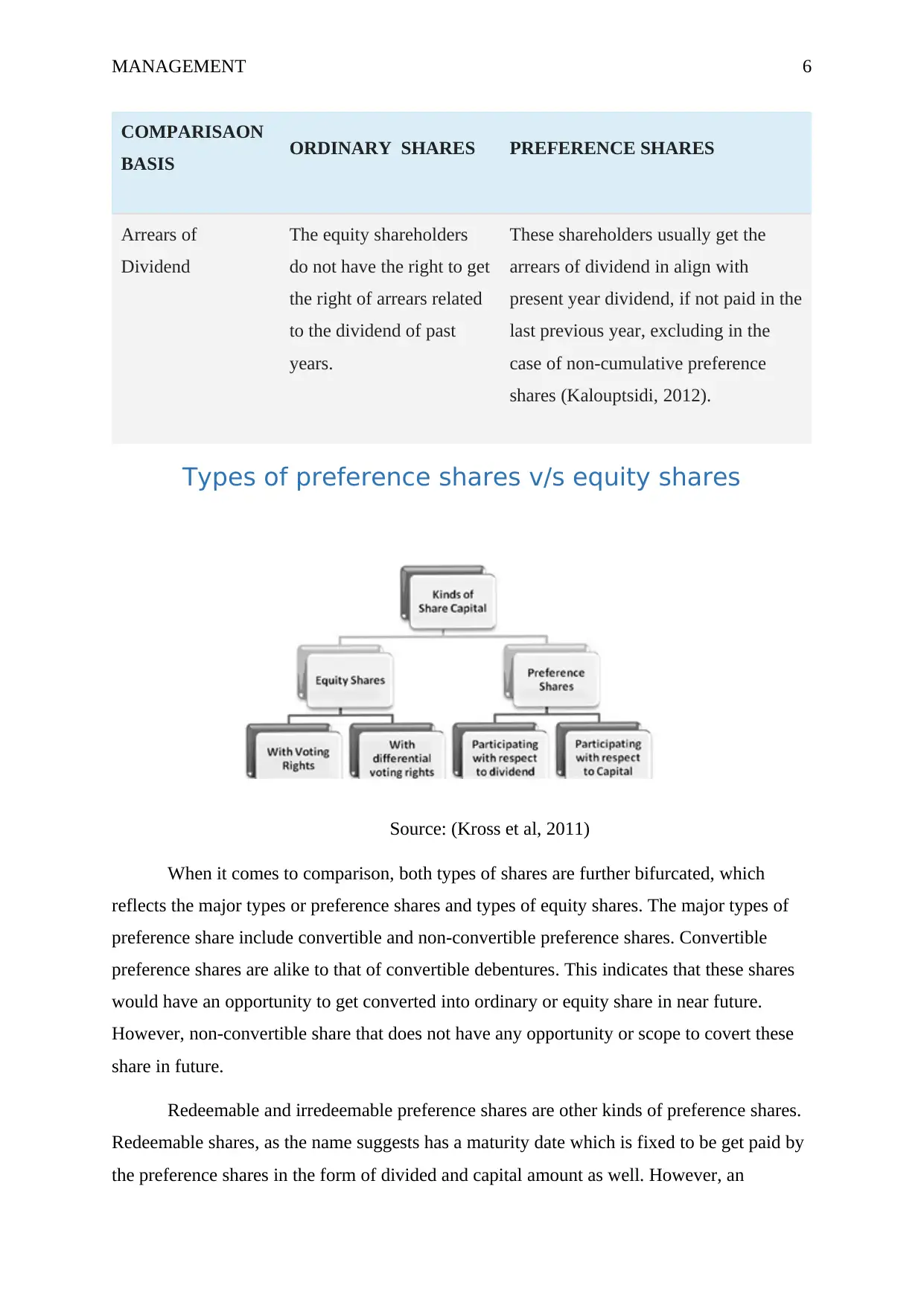
MANAGEMENT 6
COMPARISAON
BASIS ORDINARY SHARES PREFERENCE SHARES
Arrears of
Dividend
The equity shareholders
do not have the right to get
the right of arrears related
to the dividend of past
years.
These shareholders usually get the
arrears of dividend in align with
present year dividend, if not paid in the
last previous year, excluding in the
case of non-cumulative preference
shares (Kalouptsidi, 2012).
Types of preference shares v/s equity shares
Source: (Kross et al, 2011)
When it comes to comparison, both types of shares are further bifurcated, which
reflects the major types or preference shares and types of equity shares. The major types of
preference share include convertible and non-convertible preference shares. Convertible
preference shares are alike to that of convertible debentures. This indicates that these shares
would have an opportunity to get converted into ordinary or equity share in near future.
However, non-convertible share that does not have any opportunity or scope to covert these
share in future.
Redeemable and irredeemable preference shares are other kinds of preference shares.
Redeemable shares, as the name suggests has a maturity date which is fixed to be get paid by
the preference shares in the form of divided and capital amount as well. However, an
COMPARISAON
BASIS ORDINARY SHARES PREFERENCE SHARES
Arrears of
Dividend
The equity shareholders
do not have the right to get
the right of arrears related
to the dividend of past
years.
These shareholders usually get the
arrears of dividend in align with
present year dividend, if not paid in the
last previous year, excluding in the
case of non-cumulative preference
shares (Kalouptsidi, 2012).
Types of preference shares v/s equity shares
Source: (Kross et al, 2011)
When it comes to comparison, both types of shares are further bifurcated, which
reflects the major types or preference shares and types of equity shares. The major types of
preference share include convertible and non-convertible preference shares. Convertible
preference shares are alike to that of convertible debentures. This indicates that these shares
would have an opportunity to get converted into ordinary or equity share in near future.
However, non-convertible share that does not have any opportunity or scope to covert these
share in future.
Redeemable and irredeemable preference shares are other kinds of preference shares.
Redeemable shares, as the name suggests has a maturity date which is fixed to be get paid by
the preference shares in the form of divided and capital amount as well. However, an
Paraphrase This Document
Need a fresh take? Get an instant paraphrase of this document with our AI Paraphraser
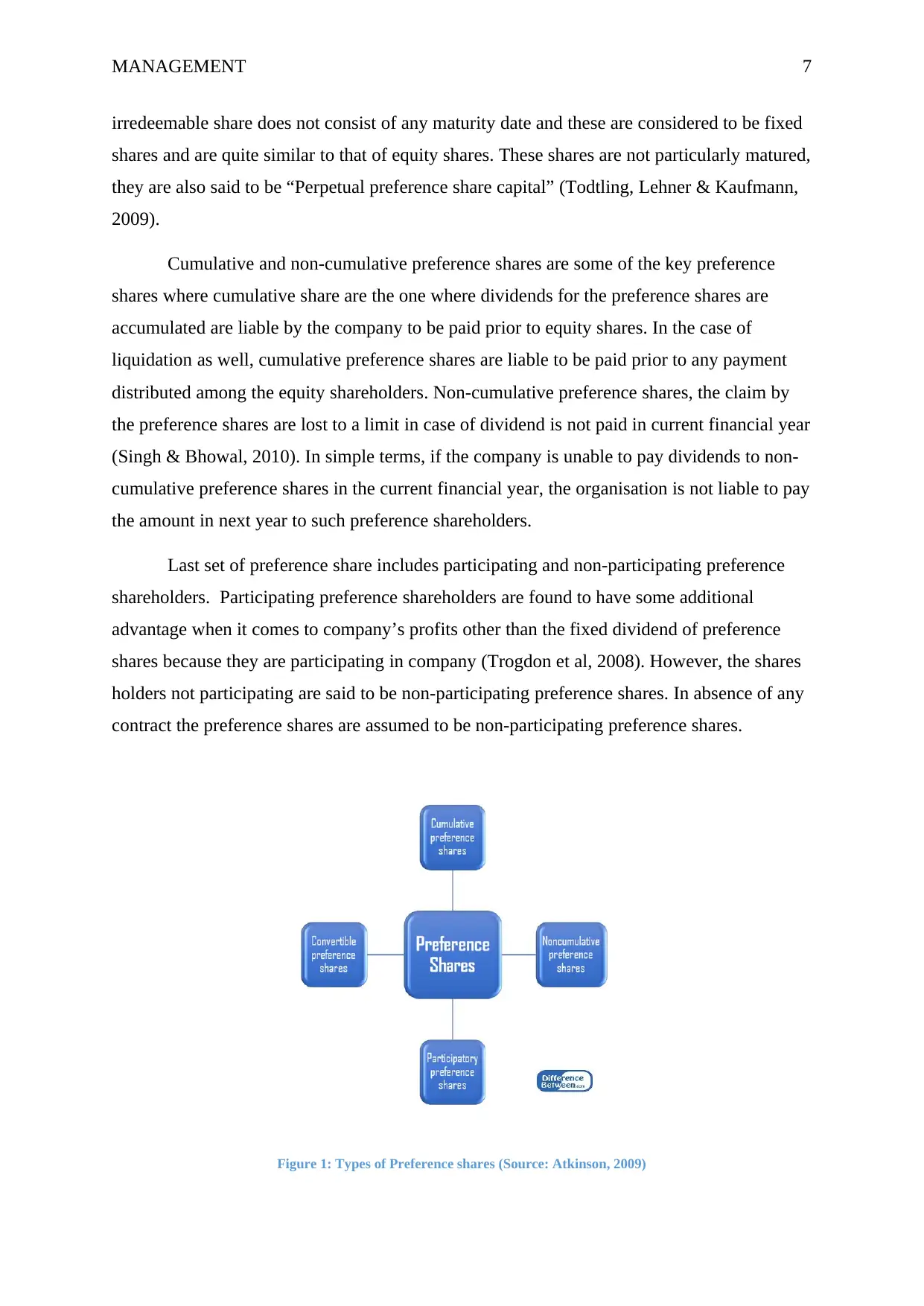
MANAGEMENT 7
irredeemable share does not consist of any maturity date and these are considered to be fixed
shares and are quite similar to that of equity shares. These shares are not particularly matured,
they are also said to be “Perpetual preference share capital” (Todtling, Lehner & Kaufmann,
2009).
Cumulative and non-cumulative preference shares are some of the key preference
shares where cumulative share are the one where dividends for the preference shares are
accumulated are liable by the company to be paid prior to equity shares. In the case of
liquidation as well, cumulative preference shares are liable to be paid prior to any payment
distributed among the equity shareholders. Non-cumulative preference shares, the claim by
the preference shares are lost to a limit in case of dividend is not paid in current financial year
(Singh & Bhowal, 2010). In simple terms, if the company is unable to pay dividends to non-
cumulative preference shares in the current financial year, the organisation is not liable to pay
the amount in next year to such preference shareholders.
Last set of preference share includes participating and non-participating preference
shareholders. Participating preference shareholders are found to have some additional
advantage when it comes to company’s profits other than the fixed dividend of preference
shares because they are participating in company (Trogdon et al, 2008). However, the shares
holders not participating are said to be non-participating preference shares. In absence of any
contract the preference shares are assumed to be non-participating preference shares.
Figure 1: Types of Preference shares (Source: Atkinson, 2009)
irredeemable share does not consist of any maturity date and these are considered to be fixed
shares and are quite similar to that of equity shares. These shares are not particularly matured,
they are also said to be “Perpetual preference share capital” (Todtling, Lehner & Kaufmann,
2009).
Cumulative and non-cumulative preference shares are some of the key preference
shares where cumulative share are the one where dividends for the preference shares are
accumulated are liable by the company to be paid prior to equity shares. In the case of
liquidation as well, cumulative preference shares are liable to be paid prior to any payment
distributed among the equity shareholders. Non-cumulative preference shares, the claim by
the preference shares are lost to a limit in case of dividend is not paid in current financial year
(Singh & Bhowal, 2010). In simple terms, if the company is unable to pay dividends to non-
cumulative preference shares in the current financial year, the organisation is not liable to pay
the amount in next year to such preference shareholders.
Last set of preference share includes participating and non-participating preference
shareholders. Participating preference shareholders are found to have some additional
advantage when it comes to company’s profits other than the fixed dividend of preference
shares because they are participating in company (Trogdon et al, 2008). However, the shares
holders not participating are said to be non-participating preference shares. In absence of any
contract the preference shares are assumed to be non-participating preference shares.
Figure 1: Types of Preference shares (Source: Atkinson, 2009)
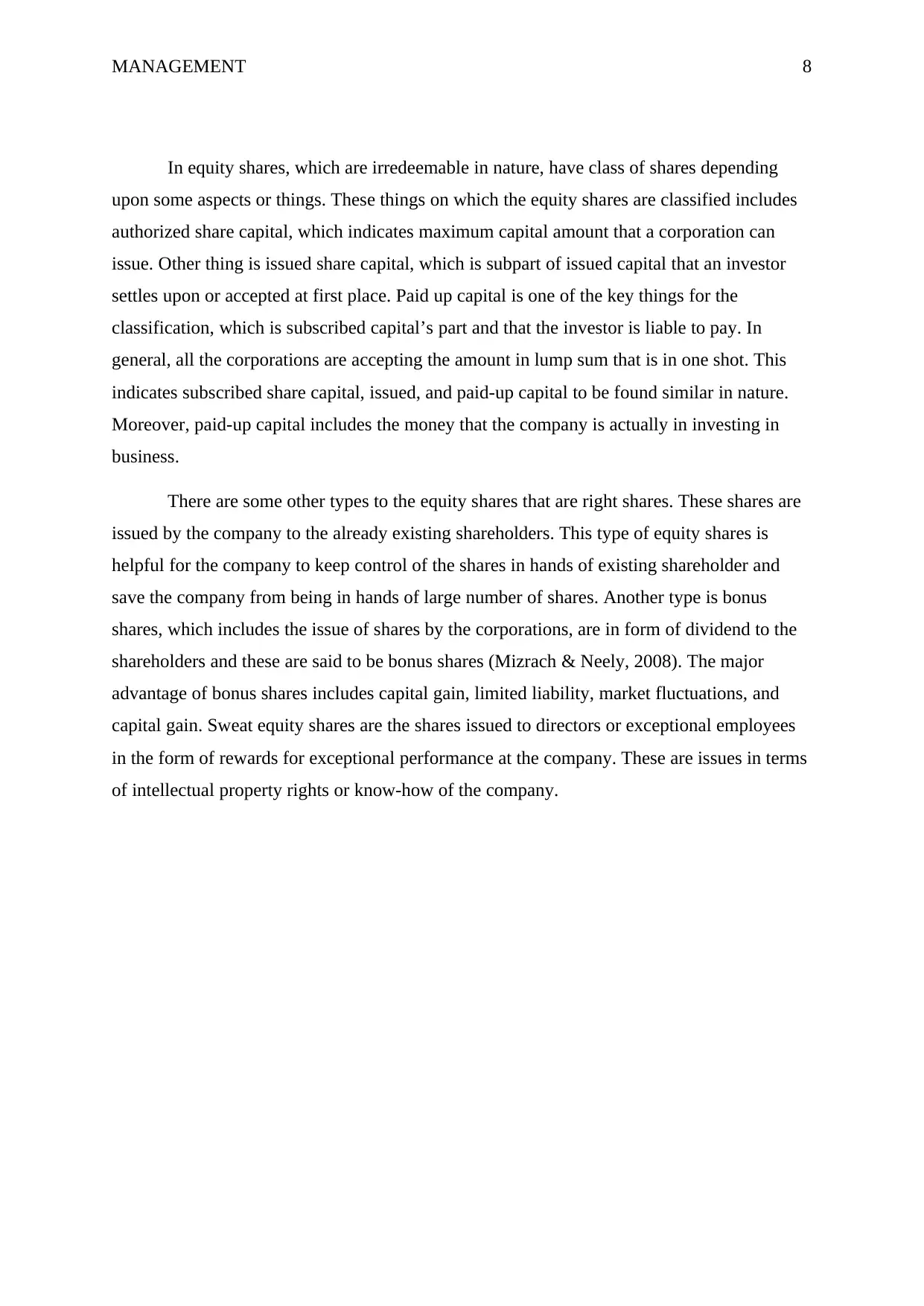
MANAGEMENT 8
In equity shares, which are irredeemable in nature, have class of shares depending
upon some aspects or things. These things on which the equity shares are classified includes
authorized share capital, which indicates maximum capital amount that a corporation can
issue. Other thing is issued share capital, which is subpart of issued capital that an investor
settles upon or accepted at first place. Paid up capital is one of the key things for the
classification, which is subscribed capital’s part and that the investor is liable to pay. In
general, all the corporations are accepting the amount in lump sum that is in one shot. This
indicates subscribed share capital, issued, and paid-up capital to be found similar in nature.
Moreover, paid-up capital includes the money that the company is actually in investing in
business.
There are some other types to the equity shares that are right shares. These shares are
issued by the company to the already existing shareholders. This type of equity shares is
helpful for the company to keep control of the shares in hands of existing shareholder and
save the company from being in hands of large number of shares. Another type is bonus
shares, which includes the issue of shares by the corporations, are in form of dividend to the
shareholders and these are said to be bonus shares (Mizrach & Neely, 2008). The major
advantage of bonus shares includes capital gain, limited liability, market fluctuations, and
capital gain. Sweat equity shares are the shares issued to directors or exceptional employees
in the form of rewards for exceptional performance at the company. These are issues in terms
of intellectual property rights or know-how of the company.
In equity shares, which are irredeemable in nature, have class of shares depending
upon some aspects or things. These things on which the equity shares are classified includes
authorized share capital, which indicates maximum capital amount that a corporation can
issue. Other thing is issued share capital, which is subpart of issued capital that an investor
settles upon or accepted at first place. Paid up capital is one of the key things for the
classification, which is subscribed capital’s part and that the investor is liable to pay. In
general, all the corporations are accepting the amount in lump sum that is in one shot. This
indicates subscribed share capital, issued, and paid-up capital to be found similar in nature.
Moreover, paid-up capital includes the money that the company is actually in investing in
business.
There are some other types to the equity shares that are right shares. These shares are
issued by the company to the already existing shareholders. This type of equity shares is
helpful for the company to keep control of the shares in hands of existing shareholder and
save the company from being in hands of large number of shares. Another type is bonus
shares, which includes the issue of shares by the corporations, are in form of dividend to the
shareholders and these are said to be bonus shares (Mizrach & Neely, 2008). The major
advantage of bonus shares includes capital gain, limited liability, market fluctuations, and
capital gain. Sweat equity shares are the shares issued to directors or exceptional employees
in the form of rewards for exceptional performance at the company. These are issues in terms
of intellectual property rights or know-how of the company.
⊘ This is a preview!⊘
Do you want full access?
Subscribe today to unlock all pages.

Trusted by 1+ million students worldwide
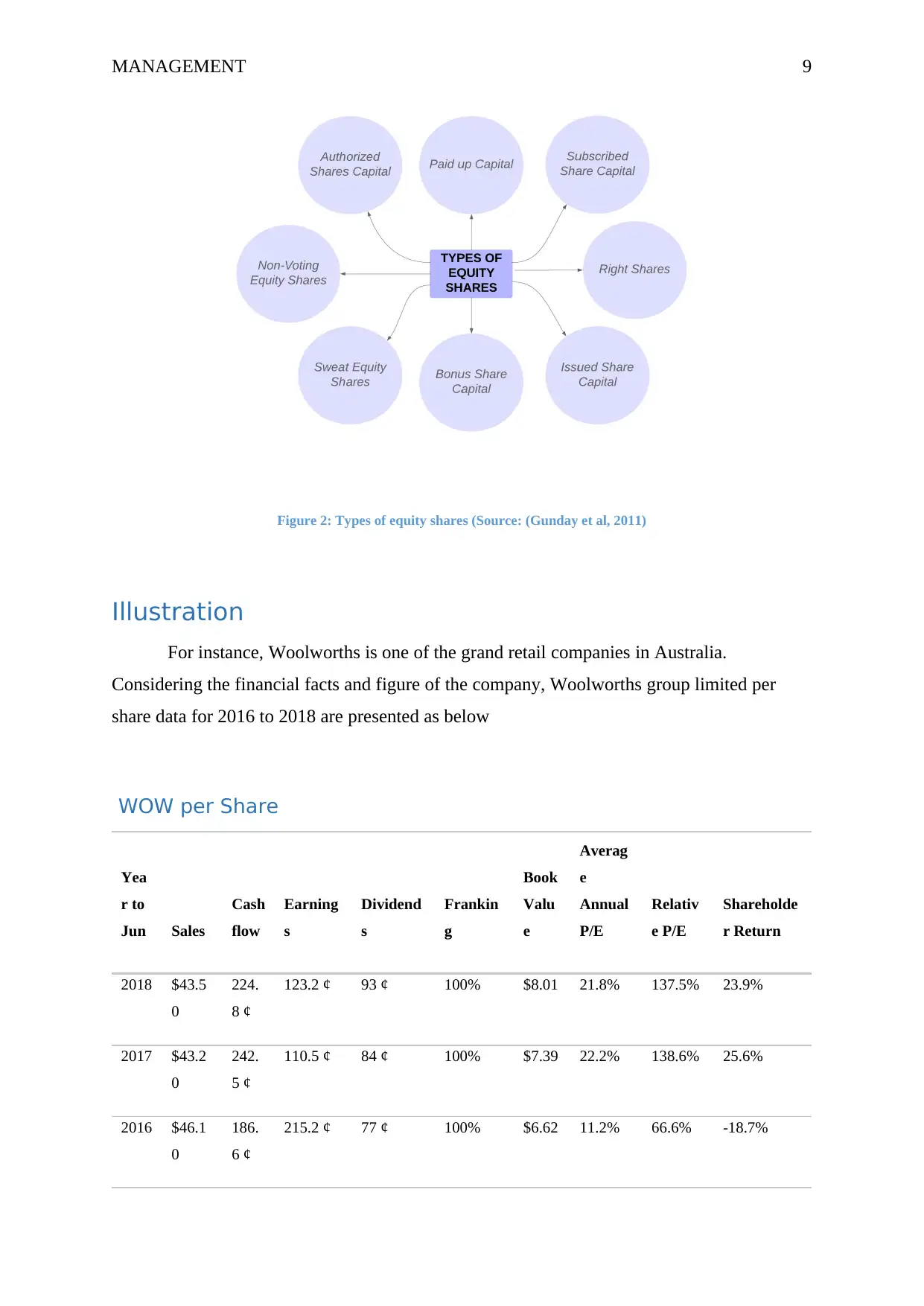
MANAGEMENT 9
Figure 2: Types of equity shares (Source: (Gunday et al, 2011)
Illustration
For instance, Woolworths is one of the grand retail companies in Australia.
Considering the financial facts and figure of the company, Woolworths group limited per
share data for 2016 to 2018 are presented as below
WOW per Share
Yea
r to
Jun Sales
Cash
flow
Earning
s
Dividend
s
Frankin
g
Book
Valu
e
Averag
e
Annual
P/E
Relativ
e P/E
Shareholde
r Return
2018 $43.5
0
224.
8 ¢
123.2 ¢ 93 ¢ 100% $8.01 21.8% 137.5% 23.9%
2017 $43.2
0
242.
5 ¢
110.5 ¢ 84 ¢ 100% $7.39 22.2% 138.6% 25.6%
2016 $46.1
0
186.
6 ¢
215.2 ¢ 77 ¢ 100% $6.62 11.2% 66.6% -18.7%
Figure 2: Types of equity shares (Source: (Gunday et al, 2011)
Illustration
For instance, Woolworths is one of the grand retail companies in Australia.
Considering the financial facts and figure of the company, Woolworths group limited per
share data for 2016 to 2018 are presented as below
WOW per Share
Yea
r to
Jun Sales
Cash
flow
Earning
s
Dividend
s
Frankin
g
Book
Valu
e
Averag
e
Annual
P/E
Relativ
e P/E
Shareholde
r Return
2018 $43.5
0
224.
8 ¢
123.2 ¢ 93 ¢ 100% $8.01 21.8% 137.5% 23.9%
2017 $43.2
0
242.
5 ¢
110.5 ¢ 84 ¢ 100% $7.39 22.2% 138.6% 25.6%
2016 $46.1
0
186.
6 ¢
215.2 ¢ 77 ¢ 100% $6.62 11.2% 66.6% -18.7%
Paraphrase This Document
Need a fresh take? Get an instant paraphrase of this document with our AI Paraphraser
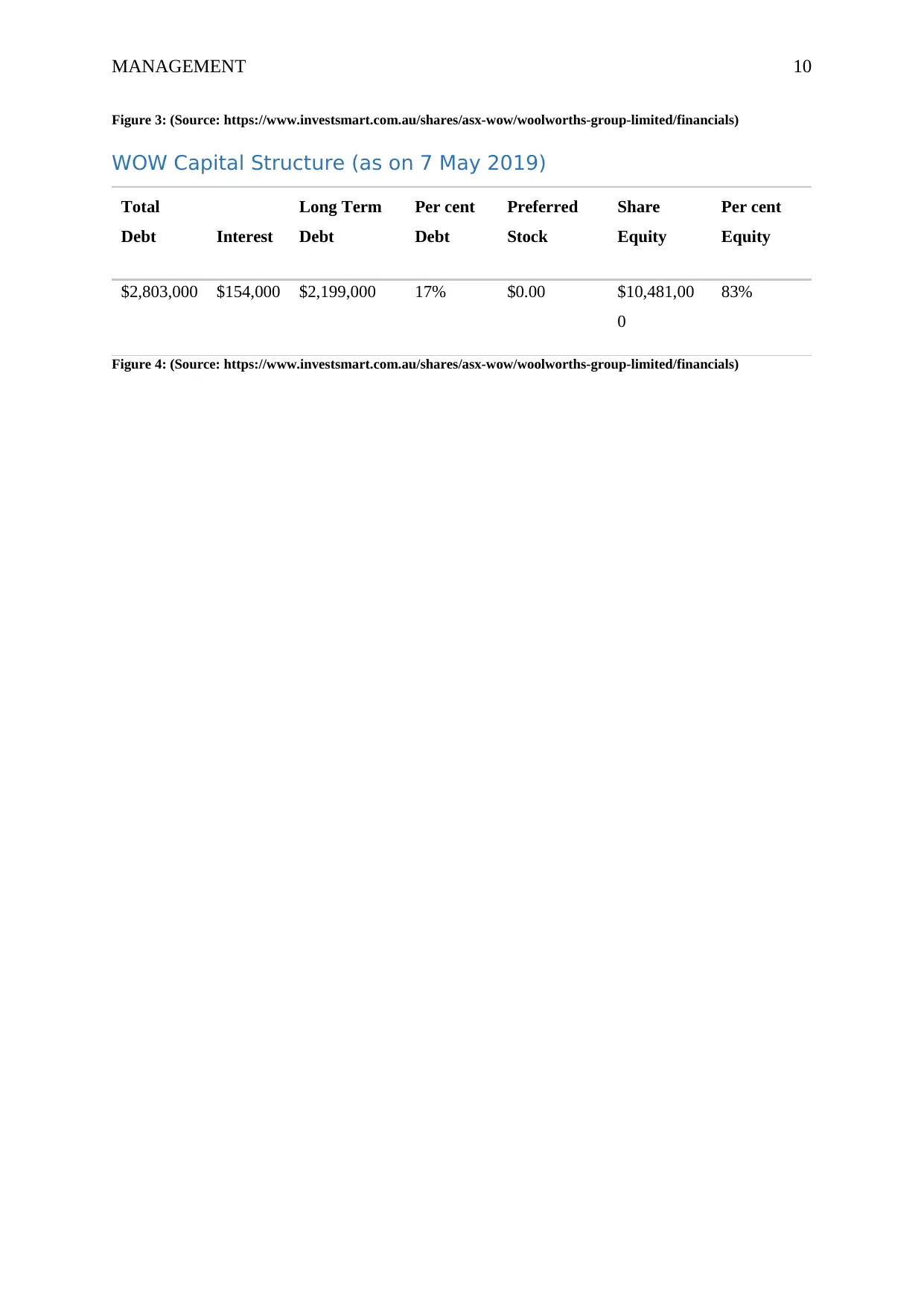
MANAGEMENT 10
Figure 3: (Source: https://www.investsmart.com.au/shares/asx-wow/woolworths-group-limited/financials)
WOW Capital Structure (as on 7 May 2019)
Total
Debt Interest
Long Term
Debt
Per cent
Debt
Preferred
Stock
Share
Equity
Per cent
Equity
$2,803,000 $154,000 $2,199,000 17% $0.00 $10,481,00
0
83%
Figure 4: (Source: https://www.investsmart.com.au/shares/asx-wow/woolworths-group-limited/financials)
Figure 3: (Source: https://www.investsmart.com.au/shares/asx-wow/woolworths-group-limited/financials)
WOW Capital Structure (as on 7 May 2019)
Total
Debt Interest
Long Term
Debt
Per cent
Debt
Preferred
Stock
Share
Equity
Per cent
Equity
$2,803,000 $154,000 $2,199,000 17% $0.00 $10,481,00
0
83%
Figure 4: (Source: https://www.investsmart.com.au/shares/asx-wow/woolworths-group-limited/financials)
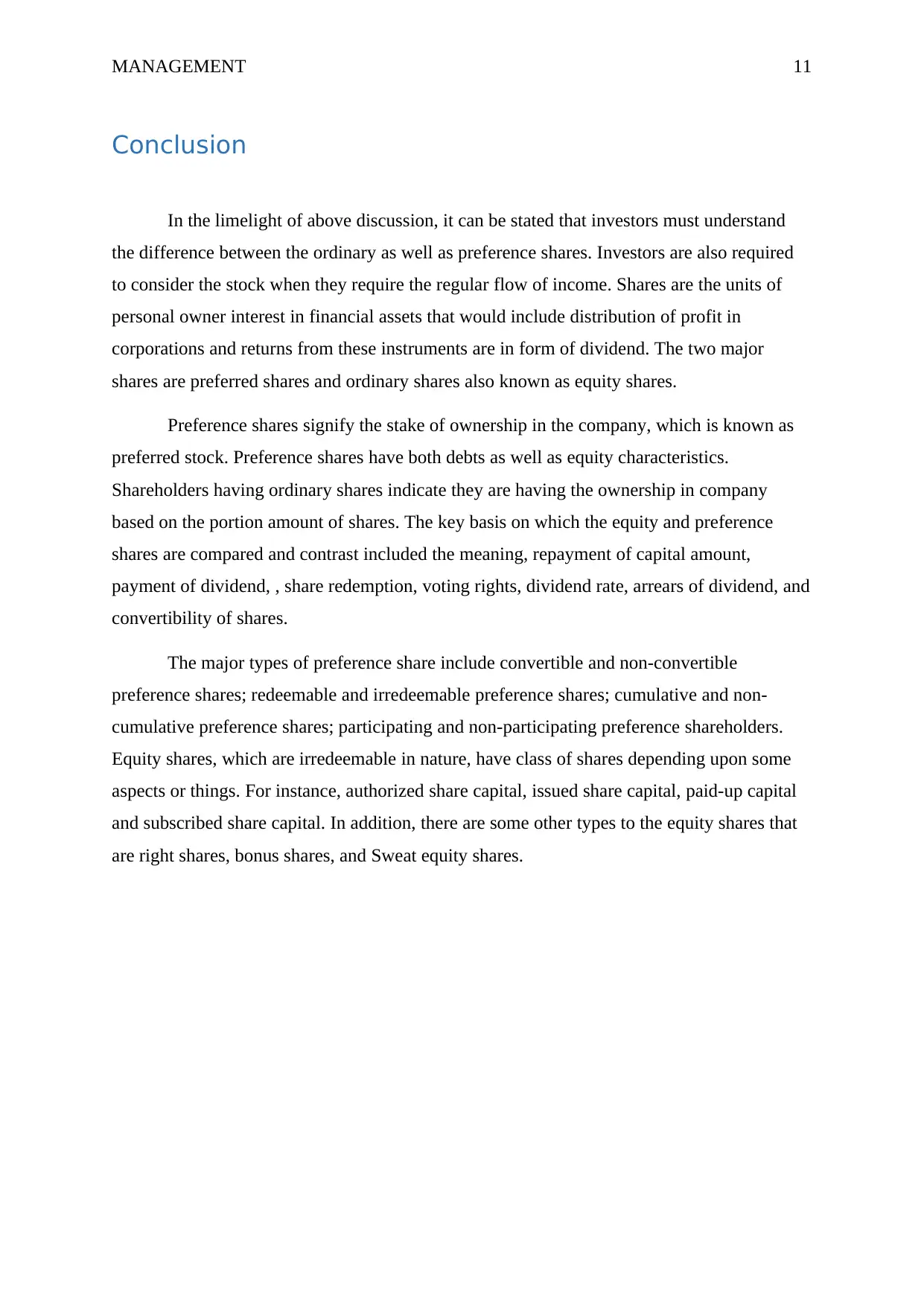
MANAGEMENT 11
Conclusion
In the limelight of above discussion, it can be stated that investors must understand
the difference between the ordinary as well as preference shares. Investors are also required
to consider the stock when they require the regular flow of income. Shares are the units of
personal owner interest in financial assets that would include distribution of profit in
corporations and returns from these instruments are in form of dividend. The two major
shares are preferred shares and ordinary shares also known as equity shares.
Preference shares signify the stake of ownership in the company, which is known as
preferred stock. Preference shares have both debts as well as equity characteristics.
Shareholders having ordinary shares indicate they are having the ownership in company
based on the portion amount of shares. The key basis on which the equity and preference
shares are compared and contrast included the meaning, repayment of capital amount,
payment of dividend, , share redemption, voting rights, dividend rate, arrears of dividend, and
convertibility of shares.
The major types of preference share include convertible and non-convertible
preference shares; redeemable and irredeemable preference shares; cumulative and non-
cumulative preference shares; participating and non-participating preference shareholders.
Equity shares, which are irredeemable in nature, have class of shares depending upon some
aspects or things. For instance, authorized share capital, issued share capital, paid-up capital
and subscribed share capital. In addition, there are some other types to the equity shares that
are right shares, bonus shares, and Sweat equity shares.
Conclusion
In the limelight of above discussion, it can be stated that investors must understand
the difference between the ordinary as well as preference shares. Investors are also required
to consider the stock when they require the regular flow of income. Shares are the units of
personal owner interest in financial assets that would include distribution of profit in
corporations and returns from these instruments are in form of dividend. The two major
shares are preferred shares and ordinary shares also known as equity shares.
Preference shares signify the stake of ownership in the company, which is known as
preferred stock. Preference shares have both debts as well as equity characteristics.
Shareholders having ordinary shares indicate they are having the ownership in company
based on the portion amount of shares. The key basis on which the equity and preference
shares are compared and contrast included the meaning, repayment of capital amount,
payment of dividend, , share redemption, voting rights, dividend rate, arrears of dividend, and
convertibility of shares.
The major types of preference share include convertible and non-convertible
preference shares; redeemable and irredeemable preference shares; cumulative and non-
cumulative preference shares; participating and non-participating preference shareholders.
Equity shares, which are irredeemable in nature, have class of shares depending upon some
aspects or things. For instance, authorized share capital, issued share capital, paid-up capital
and subscribed share capital. In addition, there are some other types to the equity shares that
are right shares, bonus shares, and Sweat equity shares.
⊘ This is a preview!⊘
Do you want full access?
Subscribe today to unlock all pages.

Trusted by 1+ million students worldwide
1 out of 14
Related Documents
Your All-in-One AI-Powered Toolkit for Academic Success.
+13062052269
info@desklib.com
Available 24*7 on WhatsApp / Email
![[object Object]](/_next/static/media/star-bottom.7253800d.svg)
Unlock your academic potential
Copyright © 2020–2026 A2Z Services. All Rights Reserved. Developed and managed by ZUCOL.




